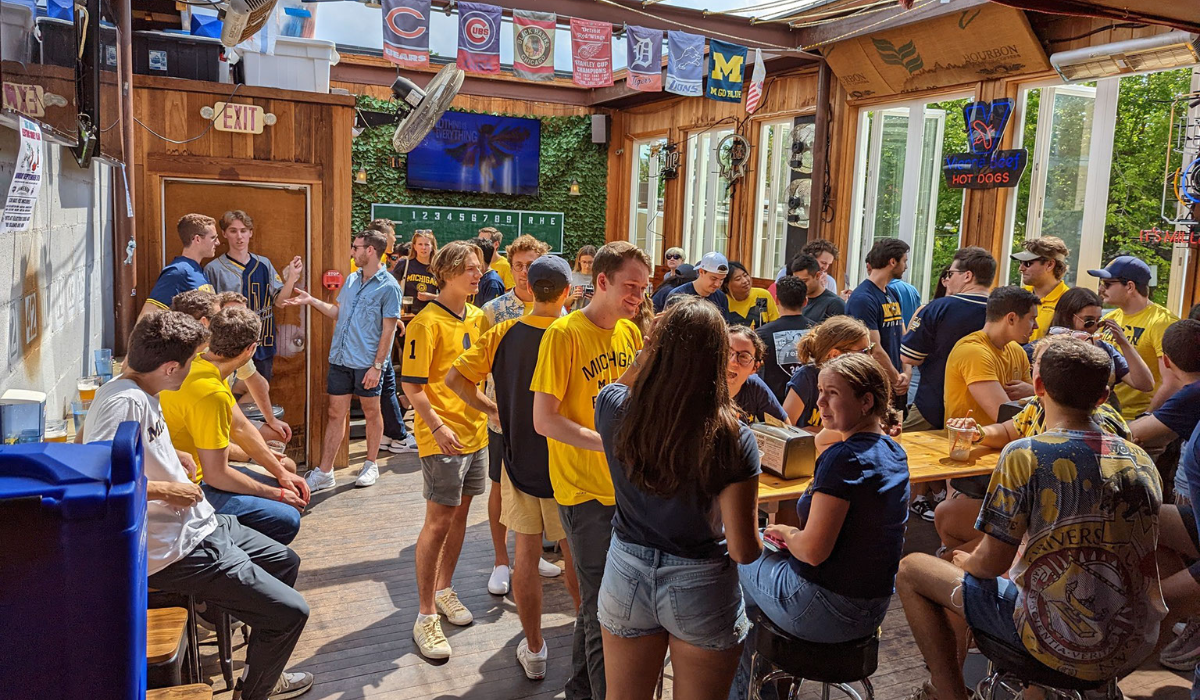The front of one of the best bars in Washington D.C. looks decidedly un-Washington D.C. The sign hanging out front is a Heileman’s Old Style sign — the banner for the cheap Midwestern beer founded in Milwaukee. When it’s warm out, a Detroit Lions flag hangs from one small rectangular window and a Chicago Cubs fan flag from the other. The door, one floor down, is next to a large shuttered window set behind security bars. The door is painted a sort of metallic light gold with hand-drawn permutations of names similar to the bar’s: Chocolate & Rose; Wine & Justice; Fish & Barrel; Blossom & Throne.
Ivy and Coney is the most authentic Midwestern bar in the city — arguably the entire Maryland/D.C./Virginia area. On U-M football game days, Ivy and Coney gets so packed that a line of fans snakes outside and down the street.
The bar is the marquee venue for watching games if your team is the Michigan Wolverines (specifically not the Spartans or the Buckeyes), the Chicago Cubs, the Detroit Lions, the Chicago Blackhawks, the Detroit Tigers, or any other team from Michigan or Chicago. It’s also the only place for miles to get an authentic Chicago hotdog, Detroit-style pizza, Malort by the bottle, and Chicago Italian beef.
Ivy and Coney’s origins are as unusual as the bar itself in a sea of increasingly high-brow restaurants, speakeasies, and wine bars. Ivy and Coney’s parents knew they wanted to open a food truck in Ann Arbor but, through a series of events, Josh Saltzman and Trent Allen, two of the eventual Kangaroo Boxing Club partners, ended up scouting the D.C. food truck scene instead. What training they had in the restaurant industry came from working at joints in Ann Arbor, including Big Ten Burrito, Charley’s, and the erstwhile Pepper’s.
“We said ‘screw it, we’re young and stupid so let’s try this,’” Saltzman recalled. But when Saltzman and Allen first came to D.C., they didn’t get into jobs anywhere close to cooking or running a small business. They worked for the Census as canvassers and eventually opened their first food truck, PORC, in 2011.
PORC served barbecue and, a year and a half later, evolved into the brick-and-mortar Kangaroo Boxing Club, something of a hipster barbecue joint/neighborhood bar nicknamed “KBC.” In my early days in D.C., KBC was the venue of choice to watch a Michigan football game or host a first or second date. It was more refined than a dive bar but less snooty than a cocktail lounge, and you never saw the shallow Capitol Hill crowd there trading business cards. The bar’s success allowed Allen, Saltzman, and Chris Powers — who attended U-M together in the early 2000s — as well as Peyton Sherwood and Adam Fry to bring Ivy and Coney to life.
The group’s idea was to create a place where you could spend $30 on four beers and a few hot dogs while yelling at your baseball team in the heart of D.C. With the credibility of KBC’s success, Ivy and Coney had the same appeal as the sequel to a cult summer action film. The name was a play on Saltzman’s musings of opening a baseball-themed bar for die-hard Cubs fans (of which there weren’t many at the time) and an allusion to Detroit’s Coney Island. The enterprise, though, wasn’t their main endeavor.
“We started Ivy and Coney as a side project. We didn’t expect it to make any money,” Saltzman said. And their prices reflected that. The beers and hot dogs were only a few bucks each and peanuts were free. It may have been a somewhat insane business plan, but to 20-somethings making $40,000-$50,000 a year, Ivy and Coney was perfect — even if its kitchen was really just a hot dog steamer and a tray.
“That obviously was underestimating how many people wanted to watch sports and eat hotdogs,” Saltzman said.
As Ivy and Coney’s popularity grew, the founding team found it harder to run a barbecue joint than a dirt-cheap sports bar. Even though it was regularly packed, high food costs limited KBC’s profitability. They revamped Kangaroo Boxing Club into The Good Silver — a bar that offered intricate cocktails and food reminiscent of home-cooked family meals. But The Good Silver didn’t catch on in the same way KBC had.
“KBC was such a special place,” Powers said. “The space, the team, the food, and the atmosphere and the warmth of the space. As much as we tried to replicate those things at Good Silver… by making the changes that we made, it lost the magic that KBC was.”
Meanwhile, Ivy and Coney was humming along and the founders were taking their jobs seriously. They wanted to make Chicago Dogs authentic, which meant spending “a fortune” importing poppy seed hot dog buns from Chicago — you can’t get those buns anywhere around here. Trust me, I’ve tried.
“We certainly pay extra money to get that neon green relish shipped out,” Powers said. “As a non-Chicagoan, I look at it and I kind of get it. For people from Chicago, that’s what makes it great.”
Powers spent countless hours perfecting their Coney Dog. He researched Lafayette Coneys and tinkered with the recipe in the middle of the night at KBC — the only time the kitchen wasn’t active.
Midwesterners loved it. So Ivy and Coney expanded its menu and started incorporating special traditions. They sold paczkis on Fat Tuesday and transformed the spot into “Chai-vy and Coney” during Hanukkah. The owners kept things fun and brought a little bit of home to D.C.
But Ivy and Coney wasn’t immune to the usual hazards of restaurant endeavors, including the coronavirus pandemic. Even with a retractable roof that turned their back room into a patio, they had to institute the same precautions as every other in-person business.
With a dedicated customer base and overhead costs just above the floor, Ivy and Coney set up takeout and delivery options and started accepting credit cards — until the pandemic, it was cash only.
“Good Silver was already done before the pandemic hit, but the support from…folks in the community and our regulars during the pandemic at Ivy [and Coney] was huge,” Powers said. “That 100 percent was the only way we were able to stay afloat and emotionally that was the life vest that we needed to keep going to work everyday, not knowing how many more days would be open.”
By 2022, some of the old crew had created yet another bar in another neighborhood, but Powers was cautious about predicting what he and his entrepreneurial colleagues would try next.
“I feel like we’ve finally gotten our feet back under us but we’re still in the same boat as a lot of restaurants where it’s like a little gun shy about diving headlong into the next project,” Powers said. “We want to breathe for a little bit before we move on to the next thing.”
Today, Ivy and Coney is a community hangout for Midwesterners who visit or come to D.C. for work or business. What really sets Ivy and Coney apart, though, is that it’s still alive and kicking as more than just a bar or a nostalgia trigger. It’s a Midwestern embassy and the only place you can get a cheap beer, a Detroit pizza, and a real Chicago Dog in D.C.
Daniel Strauss, ’10, is a staff writer and senior political correspondent for The New Republic. He previously wrote for The Guardian and Politico.
Editor’s Note: The article originally listed Zach Spencer as an owner of Ivy and Coney, rather than Adam Fry. It has been updated to correct this error.





